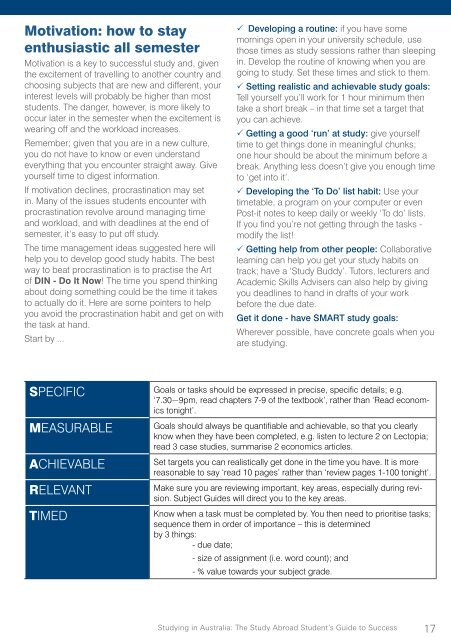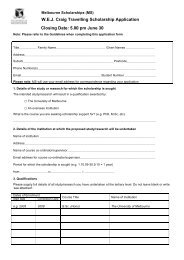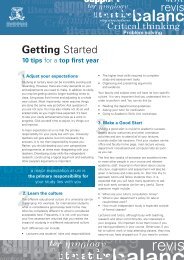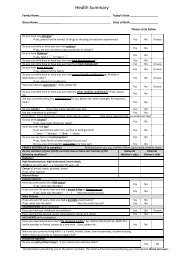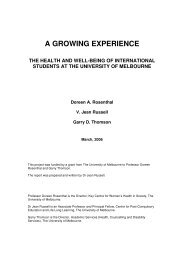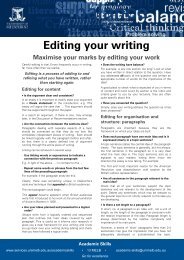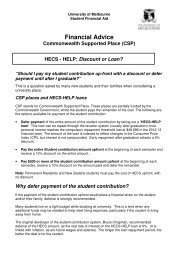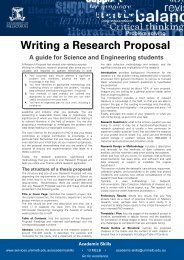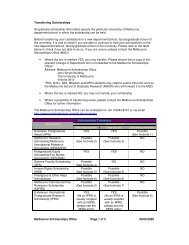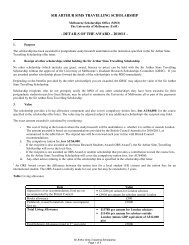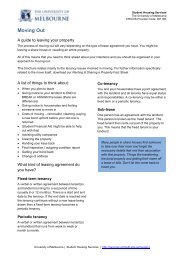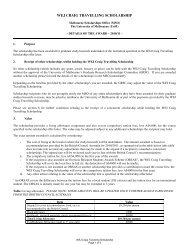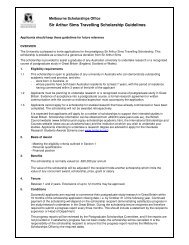Studying in Australia: The Study Abroad Student's Guide to Success
Studying in Australia: The Study Abroad Student's Guide to Success
Studying in Australia: The Study Abroad Student's Guide to Success
Create successful ePaper yourself
Turn your PDF publications into a flip-book with our unique Google optimized e-Paper software.
Motivation: how <strong>to</strong> stayenthusiastic all semesterMotivation is a key <strong>to</strong> successful study and, giventhe excitement of travell<strong>in</strong>g <strong>to</strong> another country andchoos<strong>in</strong>g subjects that are new and different, your<strong>in</strong>terest levels will probably be higher than moststudents. <strong>The</strong> danger, however, is more likely <strong>to</strong>occur later <strong>in</strong> the semester when the excitement iswear<strong>in</strong>g off and the workload <strong>in</strong>creases.Remember; given that you are <strong>in</strong> a new culture,you do not have <strong>to</strong> know or even understandeveryth<strong>in</strong>g that you encounter straight away. Giveyourself time <strong>to</strong> digest <strong>in</strong>formation.If motivation decl<strong>in</strong>es, procrast<strong>in</strong>ation may set<strong>in</strong>. Many of the issues students encounter withprocrast<strong>in</strong>ation revolve around manag<strong>in</strong>g timeand workload, and with deadl<strong>in</strong>es at the end ofsemester, it’s easy <strong>to</strong> put off study.<strong>The</strong> time management ideas suggested here willhelp you <strong>to</strong> develop good study habits. <strong>The</strong> bestway <strong>to</strong> beat procrast<strong>in</strong>ation is <strong>to</strong> practise the Ar<strong>to</strong>f DIN - Do It Now! <strong>The</strong> time you spend th<strong>in</strong>k<strong>in</strong>gabout do<strong>in</strong>g someth<strong>in</strong>g could be the time it takes<strong>to</strong> actually do it. Here are some po<strong>in</strong>ters <strong>to</strong> helpyou avoid the procrast<strong>in</strong>ation habit and get on withthe task at hand.Start by ...P Develop<strong>in</strong>g a rout<strong>in</strong>e: if you have somemorn<strong>in</strong>gs open <strong>in</strong> your university schedule, usethose times as study sessions rather than sleep<strong>in</strong>g<strong>in</strong>. Develop the rout<strong>in</strong>e of know<strong>in</strong>g when you arego<strong>in</strong>g <strong>to</strong> study. Set these times and stick <strong>to</strong> them.P Sett<strong>in</strong>g realistic and achievable study goals:Tell yourself you’ll work for 1 hour m<strong>in</strong>imum thentake a short break – <strong>in</strong> that time set a target thatyou can achieve.P Gett<strong>in</strong>g a good ‘run’ at study: give yourselftime <strong>to</strong> get th<strong>in</strong>gs done <strong>in</strong> mean<strong>in</strong>gful chunks;one hour should be about the m<strong>in</strong>imum before abreak. Anyth<strong>in</strong>g less doesn’t give you enough time<strong>to</strong> ‘get <strong>in</strong><strong>to</strong> it’.P Develop<strong>in</strong>g the ‘To Do’ list habit: Use yourtimetable, a program on your computer or evenPost-it notes <strong>to</strong> keep daily or weekly ‘To do’ lists.If you f<strong>in</strong>d you’re not gett<strong>in</strong>g through the tasks -modify the list!P Gett<strong>in</strong>g help from other people: Collaborativelearn<strong>in</strong>g can help you get your study habits ontrack; have a ‘<strong>Study</strong> Buddy’. Tu<strong>to</strong>rs, lecturers andAcademic Skills Advisers can also help by giv<strong>in</strong>gyou deadl<strong>in</strong>es <strong>to</strong> hand <strong>in</strong> drafts of your workbefore the due date.Get it done - have SMART study goals:Wherever possible, have concrete goals when youare study<strong>in</strong>g.SPECIFICMEASURABLEACHIEVABLERELEVANTTIMEDGoals or tasks should be expressed <strong>in</strong> precise, specific details; e.g.‘7.30~9pm, read chapters 7-9 of the textbook’, rather than ‘Read economics<strong>to</strong>night’.Goals should always be quantifiable and achievable, so that you clearlyknow when they have been completed, e.g. listen <strong>to</strong> lecture 2 on Lec<strong>to</strong>pia;read 3 case studies, summarise 2 economics articles.Set targets you can realistically get done <strong>in</strong> the time you have. It is morereasonable <strong>to</strong> say ‘read 10 pages’ rather than ‘review pages 1-100 <strong>to</strong>night’.Make sure you are review<strong>in</strong>g important, key areas, especially dur<strong>in</strong>g revision.Subject <strong>Guide</strong>s will direct you <strong>to</strong> the key areas.Know when a task must be completed by. You then need <strong>to</strong> prioritise tasks;sequence them <strong>in</strong> order of importance – this is determ<strong>in</strong>edby 3 th<strong>in</strong>gs:- due date;- size of assignment (i.e. word count); and- % value <strong>to</strong>wards your subject grade.<strong><strong>Study</strong><strong>in</strong>g</strong> <strong>in</strong> <strong>Australia</strong>: <strong>The</strong> <strong>Study</strong> <strong>Abroad</strong> Student’s <strong>Guide</strong> <strong>to</strong> <strong>Success</strong>17


